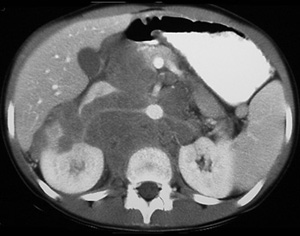- Home
- Editorial
- News
- Practice Guidelines
- Anesthesiology Guidelines
- Cancer Guidelines
- Cardiac Sciences Guidelines
- Critical Care Guidelines
- Dentistry Guidelines
- Dermatology Guidelines
- Diabetes and Endo Guidelines
- Diagnostics Guidelines
- ENT Guidelines
- Featured Practice Guidelines
- Gastroenterology Guidelines
- Geriatrics Guidelines
- Medicine Guidelines
- Nephrology Guidelines
- Neurosciences Guidelines
- Obs and Gynae Guidelines
- Ophthalmology Guidelines
- Orthopaedics Guidelines
- Paediatrics Guidelines
- Psychiatry Guidelines
- Pulmonology Guidelines
- Radiology Guidelines
- Surgery Guidelines
- Urology Guidelines
Clinical Practice Guidelines for Neuroblastoma Imaging: European Association of Nuclear Medicine

The European Association of Nuclear Medicine (EANM) has released updated clinical practice guidelines for imaging in neuroblastoma (NB), cancer that develops from immature nerve cells found in several areas of the body.
The guidelines are published in the European Journal of Nuclear Medicine and Molecular Imaging.
Neuroblastoma is the third common tumour in children. It arises from the primordial neural crest cells that form the sympathetic nervous system. The exact etiology of this disease is not yet known. Imaging plays an important role in the diagnosis, staging, treatment planning, response evaluation and in a follow-up of a case of Neuroblastoma.
mIBG Imaging
123I-mIBG is the most common study in nuclear medicine for the evaluation of neuroblastoma. Certain medications can potentially affect mIBG uptake, and the EANM recommends withholding labetalol, desipramine, reserpine, and phenylpropanolamine.
Thyroid blockade for 123I-mIBG – Lugol’s Iodine Solution
- Administer dose 0.6 mL of 5% solution per day 2 days before 123I-mIBG injection, and continue for 3 days after injection.
- Dilute the solution in any drink such as milk, or juice, an undiluted form may burn the throat.
- The dose can be given as a single dose each day or split into 2 × 0.3 mL doses.
Thyroid Blockade for 123I-mIBG – Potassium Iodate Tablets
- In children aged 1 month to 3 years administer 42.5 mg (half a tablet) potassium iodate orally 1 hour prior to mIBG injection, in the evening of that day, and on the following day after the mIBG scan (in total, three tablets in 2 days; in infants and young children the tablet can be crushed, dissolved in 2 mL of sterile water, and administered with a syringe to the back of the throat).
- In children, aged 3 to 12 years administer 85 mg (one tablet) potassium iodate orally 1 hour prior to mIBG injection, in the evening of that day, and on the following day after the mIBG scan (in total, three tablets in 2 days).
- In patients aged 12 years and older administer 170 mg (two tablets) potassium iodate orally 1 hour prior to mIBG injection, in the evening of that day, and on the following day after the mIBG scan (in total, three tablets in 2 days).
Thyroid Blockade for 131I-mIBG
- Administer a saturated solution of potassium iodide (SSKI) 30–60 min prior to injection of 131I-mIBG, orally from day 0, and continue for a week.
- Adult dosage: six drops of SSKI on day 0 and two drops of SSKI three times a day orally, beginning on the morning of day 1 and continuing for 1 week.
- Children ages 1 month or younger: one drop orally 30–60 min prior to 131I-mIBG injection, then one drop orally in the morning of day 1, and daily for 1 week following injection.
- Children ages 1 month to 3 years: two drops orally 30–60 min prior to 131I-mIBG injection, then one drop orally twice a day beginning in the morning of day 1 and continuing for 1 week following injection.
- Children ages 3 to 18 years: three drops orally 30–60 min prior to 131I-mIBG injection, then one drop orally three times a day beginning in the morning of day 1 and continuing for 1 week following injection.
- Adult patients and patients weighing ≥70 kg: six drops orally 30–60 min after 131I-mIBG injection, then two drops orally three times a day beginning in the morning of day 1 and continuing for 1 week following injection.
Thyroid Blockade with Potassium Perchlorate
- Potassium perchlorate should be used in individuals sensitive to iodine, and if no other method for thyroid blockade is available.
- Dose 10 mg/kg (maximum dose 500 mg, minimum dose 50 mg).
- Potassium perchlorate comes in 200 mg capsules, and these should be opened and the contents either placed on a sugar lump (or similar) or dissolved in a flavoured drink.
- Potassium perchlorate is taken 1 hour prior to 123I-mIBG injection and up to five times in the following 36 hours.
For further reference log on to https://doi.org/10.1007/s00259-018-4070-8

Disclaimer: This site is primarily intended for healthcare professionals. Any content/information on this website does not replace the advice of medical and/or health professionals and should not be construed as medical/diagnostic advice/endorsement or prescription. Use of this site is subject to our terms of use, privacy policy, advertisement policy. © 2020 Minerva Medical Treatment Pvt Ltd